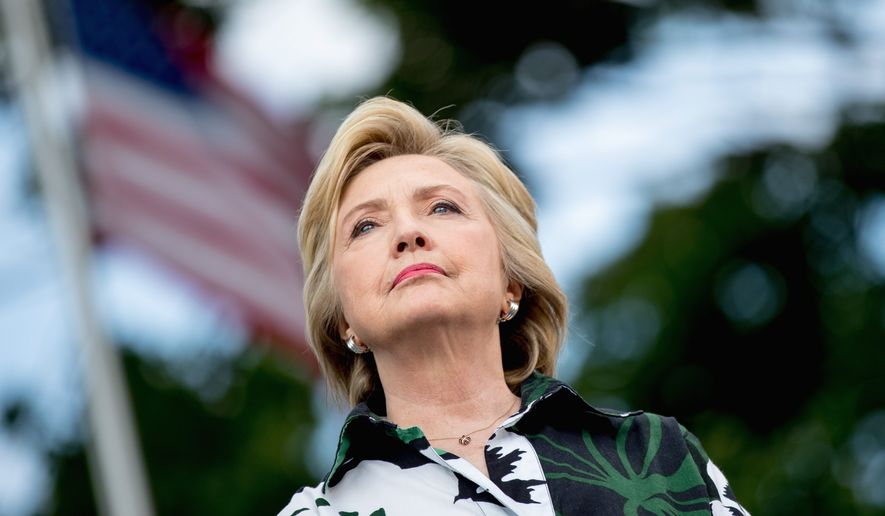Hillary Clinton’s presidential campaign struggled Monday to square her claims that she told the truth about her secret email account with the sworn testimony of the FBI director last month, as top Clinton aides insisted that Mrs. Clinton didn’t mean to mislead voters with her various explanations.
On Sunday, the former secretary of state again said she never sent or received classified information on her server — though FBI Director James B. Comey said she handled multiple email chains, some including top-secret information that was classified at the time it passed through her hands. Three messages even included markings labeling classified information.
Media fact-checkers rejected Mrs. Clinton’s explanation Monday. PolitiFact rated it a “Pants on Fire,” and The Washington Post gave it “four pinocchios.” Both of those are the worst ratings on their respective scales.
But Clinton surrogates fanned out across television networks to say the Democratic presidential nominee has been truthful and consistent.
“What we have always maintained and still maintain is that she did not believe that those emails were classified,” top campaign spokesman Brian Fallon said on MSNBC. “They lacked any markings. They were sent to her by people that know the difference between what’s classified and what’s not.”
That contradicts a statement by Mr. Comey, who last month said he found evidence that Mrs. Clinton sent and received classified information and was “extremely careless” in handling it. But he concluded that she wasn’t sophisticated enough to understand the material and was too technologically inept to comprehend the risks she was taking.
SEE ALSO: Hillary Clinton contradicts FBI, says no classified info in emails
Mrs. Clinton over the weekend, in an interview with “Fox News Sunday,” said none of the aides with whom she exchanged emails was sending information flagged as classified, so she didn’t see any reason to second-guess their judgment. She said the information was deemed classified later but was fine to send at the time.
Mrs. Clinton also insisted that she has told a consistent version of events related to her emails and said Mr. Comey backed up her assertion in his sworn testimony.
Fact-checkers, though, said Mr. Comey said only that Mrs. Clinton didn’t lie to the FBI. He conspicuously refused to answer questions about whether she was truthful with the public. When pressed on some specific statements she did make in public, Mr. Comey said those weren’t true.
“We rate her claim as pants on fire,” PolitiFact concluded.
Attempting to explain, Clinton campaign manager Robby Mook said Mr. Comey told Congress that Mrs. Clinton didn’t know what she was handling was classified.
“What the director of the FBI testified was that he did not see a basis to believe she knew the information in question was classified when she received it,” Mr. Mook said on MSNBC. “That’s what he said.”
On the campaign trail, Mrs. Clinton stayed away from the email controversy. At an appearance in Omaha, Nebraska, on Monday afternoon she instead talked about her plans to pour taxpayer money into infrastructure projects.
She was introduced at the event by billionaire investor Warren Buffett, a longtime advocate for raising taxes, who challenged Mr. Trump to release his tax returns. Mr. Trump has refused to do so, saying he is facing an audit and can’t put that information out in public during such a proceeding.
Mr. Buffett said he is facing an audit too and that each of them should release their returns and hold a press conference about it.
“You will learn a whole lot more about Donald Trump if he produces his income tax returns,” Mr. Buffett said.
Meanwhile, the State Department told a federal judge that there is no reason to subject the former secretary to a deposition to find out why she set up the secret server.
Mrs. Clinton said in a “60 Minutes” interview in July that someone recommended she use her private server, and her critics want to know who that person was, and whether it was an effort to thwart open-records laws.
Mrs. Clinton did end up thwarting the Freedom of Information Act by keeping her communications private for nearly six years, but both of her attorneys and those for the State Department said that wasn’t her intent.
“Nothing about former Secretary Clinton’s statement that her personal email system was recommended to her as convenient suggests that there was any intent to thwart FOIA, the sole topic for which the court permitted limited discovery in this matter,” Benjamin C. Mizer, the principal deputy assistant attorney general, said in a court filing.
The State Department filed another brief Monday urging the judge not to release the video depositions of those who have already testified in the email case, saying there is too much danger that the videos would be “presented to the public inaccurately or out of context.”
⦁ Ben Wolfgang contributed to this article.
• Stephen Dinan can be reached at sdinan@washingtontimes.com.
• David Sherfinski can be reached at dsherfinski@washingtontimes.com.




Please read our comment policy before commenting.